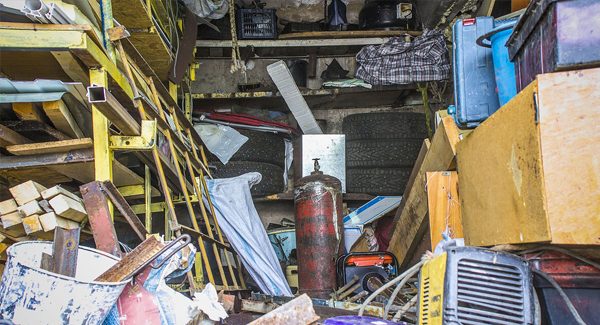- What defines a hoarding situation?
It is important to be able to identify a hoarding situation in the event one is present within your Association. Hoarding is defined by Merriam-Webster Dictionary as “the compulsion to continually accumulate a variety of items that are often considered useless accompanied by an inability to discard the items without great distress”. Hoarding goes beyond normal clutter, and a hoarding disorder can manifest on its own, in response to trauma, or in conjunction with other mental health disorders.
A hoarding situation in residential units and/or garage units can be identified in a number of ways:
- Visibly, a hoarding situation will often present itself with stacks or piles of items. However, a unit owner may take steps to block individuals from viewing their unit by having the blinds closed or not opening the door all the way to prevent others from discovering the conditions. The unit owner may also refuse to allow the Board to access the unit for maintenance issues.
- A hoarding situation may also be detectable by smell. Animal and/or degrading food odors can emanate from a unit into the hallways or neighboring units, alerting others to a potential issue.
- Why is hoarding an Association issue?
A hoarding environment within the Association can create adverse health issues and safety hazards for all Association residents, not just the unit owner. Most often, hoarding masks structural and maintenance issues within the unit which merit attention, such as cracks in the walls or utility issues. Over time, these unit issues may spread to common elements. As most of these issues may be buried under an accumulation of items, the unit owner may not even be aware of some of the issues plaguing their unit until significant damage has occurred.
- When should something be done?
Associations should take immediate action when addressing a hoarding situation. In addition to issues outlined earlier, hoarding situations can evolve quickly in to association-wide health hazards.
Debris in a hoarder’s unit can attract and breed infestations of roaches, ants, silverfish, and rodents.
- Damp, unsanitary conditions are a breeding ground for mold and bacteria that can migrate into walls and HVAC ducts.
- Debris in a hoarder’s unit become a fire hazard (ex. piles of flammable material near electrical sockets).
If the Association becomes aware of these unit issues and takes no action, it can be liable for damage to surrounding units and health injuries to neighboring residents.
- What can an Association do to address a hoarding situation?
Once alerted, the Board will need to access the unit to determine if a hoarding situation is present, and if so, determine if the conditions present a safety issue. The Illinois Condominium Property Act, the Illinois Common Interest Community Act as well as most Association Declaration provide specific provisions granting the Board authority to address hoarding unit owners.
State and local Departments of Health and Human Services can assist in identifying hoarding situations and provide resources to unit owners struggling with a hoarding disorder. Associations can also refer a hoarding owner to specialized counseling services as well as cleaning/sanitation services.
Legal action should be considered after well documented, good faith efforts have been made with the hoarding owner to resolve the problem. Board members should be proactive to work with legal counsel to adopt rules addressing expectations regarding the condition of units, detail owner responsibilities, and outline steps in the event of non-compliance.
If your association has legal concerns regarding a hoarding situation, do not hesitate to contact our law firm.
Since 1983, KSN has been a legal resource for condominium, homeowner, and townhome associations. Additionally, we represent clients in real estate transactions, collections, landlord/tenant issues, and property tax appeals. We represent thousands of clients and community associations throughout the US with offices in several states including Florida, Illinois, Indiana, and Wisconsin.
Call 855-537-0500 or visit www.ksnlaw.com to get started.
—
This article is made available by the lawyer or law firm publisher for educational purposes only as well as to give you general information and a general understanding of the law, not to provide specific legal advice. By reading this article you understand that there is no attorney client relationship between you and the article author. This article should not be used as a substitute for competent legal advice from a licensed professional attorney in your state. © 2019 Kovitz Shifrin Nesbit, A Professional Corporation.

